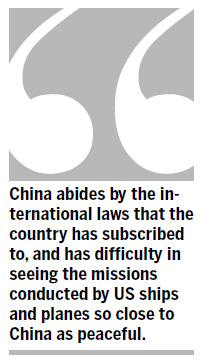Spying activities unacceptable
Updated: 2011-11-21 08:01
By Shen Dingli (China Daily)
|
|||||||||

The US should not use freedom of navigation as a means to conduct unlawful intelligence gathering operations
Lately the United States has made a number of moves to reassert its position in Asia Pacific. As a global power with a traditional emphasis on the Asia-Pacific region, these moves have been quite symbolic. For instance, its decision to deploy a few hundred US marines in Australia on a rotational basis will only enhance the legitimate defense of Australia in a trivial way, but they could well undermine the security of Australia should Canberra allow these marines to meddle in the internal affairs of other countries in the region in an aggressive way.
Similarly, the US has been clamoring about freedom of navigation in the South China Sea, but Beijing accepts the principle of freedom of navigation as imbedded in the United Nations Convention on the Law of the Sea (UNCLOS), which China and other countries helped to establish in 1982. China's difference with the US, if any, is to stress that such a right has a limit, and freedom of navigation only applies to peaceful purposes, especially when it comes to exclusive economic zones (EEZs), as is clearly set out in UNCLOS.
China and the US do have appreciable differences in interpreting what constitutes freedom of navigation for "peaceful use", especially when it comes to the US navy's intelligence gathering within China's EEZs. The US uses freedom of navigation to justify its reconnaissance operations close to China's territorial space and water. The Chinese, viewing the US arms sales to Taiwan as having already violated the UN Charter, the source of all contemporary international laws, can hardly accept the legitimacy of these espionage operations.
China has made its position clear that its core interests in the South China Sea are all the islands, reefs and surrounding waters. China will take all measures at its disposal to protect its core interests. For China's EEZs, the country views them as its vital interests and, therefore, will take any necessary action to ensure that the freedom of navigation in these waters is truly peaceful.
In fact China and the US share common interests in a wide range of issues. China respects the US' legitimate interests - legitimate under the UN Charter - but will not accept US behavior that is not sanctioned by the Charter. China abides by the international laws that the country has subscribed to, and has difficulty in seeing the missions conducted by US ships and planes so close to China as peaceful. China will cooperate with all other nations to make sure that freedom of navigation is not abused.
Therefore, China will defend its own legitimate interests, as well as those of others, according to international law.
President Barack Obama has said that the US would not attempt to stop China benefiting from its rise, for which he should be commended, and he should also be commended for his statement that the US is not afraid of China's rise. China's rise is a peaceful process and a natural result of its opening-up and international cooperation, including cooperation with the US. Therefore, the US should not be afraid of an outcome that it has helped to create. The US' recent so-called strategic shift to the Asia Pacific with an eye on China is in fact un-strategic.
Meanwhile, the Trans-Pacific Partnership (TPP) is an ambitious, 21st-century agreement that aspires to enhance trade and investment, promote innovation, economic growth and development, and support the creation and retention of jobs amongst its partners. There seems to be some quite erroneous perceptions of such a system, which in fact is still being negotiated. On the east side of the Pacific, the TPP has been viewed as a new trade and investment framework that the US will dominate. On the west side of the Pacific, there are concerns about any US-led groupings, old or new.
In fact, the TPP is yet to unfold, but there are many overlapping regional and global systems already, so it should come as no surprise to see another emerging.
The author is a professor at Fudan University in Shanghai and director of its Center for American Studies.
(China Daily 11/21/2011 page8)











